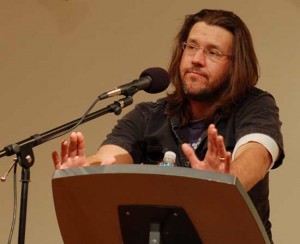
Like many people who participated in the Infinite Summer, I just finished reading Infinite Jest, the sprawling masterwork of recently deceased American author David Foster Wallace (above). I mention this for 2 reaons: (1) since people first began finishing the novel in 1996, it has been de rigeur to make said deed publicly known on the internet, and (2) because in my various post-Jest Infinite Internet Wanderings, I stumbled upon such a lovely quote by Mr. Wallace that I just had to share it. This comes from a ’96 Salon.com interview with the author, and let’s just say, I think it applies equally well to the world of serious music:
If an art form is marginalized it’s because it’s not speaking to people. One possible reason is that the people it’s speaking to have become too stupid to appreciate it. That seems a little easy to me.
If you, the writer, succumb to the idea that the audience is too stupid, then there are two pitfalls. Number one is the avant-garde pitfall, where you have the idea that you’re writing for other writers, so you don’t worry about making yourself accessible or relevant. You worry about making it structurally and technically cutting edge: involuted in the right ways, making the appropriate intertextual references, making it look smart. Not really caring about whether you’re communicating with a reader who cares something about that feeling in the stomach which is why we read. Then, the other end of it is very crass, cynical, commercial pieces of fiction that are done in a formulaic way — essentially television on the page — that manipulate the reader, that set out grotesquely simplified stuff in a childishly riveting way.
What’s weird is that I see these two sides fight with each other and really they both come out of the same thing, which is a contempt for the reader, an idea that literature’s current marginalization is the reader’s fault. The project that’s worth trying is to do stuff that has some of the richness and challenge and emotional and intellectual difficulty of avant-garde literary stuff, stuff that makes the reader confront things rather than ignore them, but to do that in such a way that it’s also pleasurable to read. The reader feels like someone is talking to him rather than striking a number of poses.
That’s so beautiful it could have been written by Alfred Schnittke. [Although Schnittke put the same thought quite elegantly with his famous statement, “the aim of my life is to unify serious music and light music, even if I break my neck in doing so.”]
Here we are 13 years later, and I have to say, I think that the situation has improved greatly, at least as far as music is concerned. There’s plenty of really excellent serious stuff that is both interesting and entertaining. Personally, I think most of that comes from people like Björk, Sufjan Stevens, and Animal Collective, but even students in Academe these days seem to have the “right” challenge in mind – much more so even than when I started college in ’01. This new state of affairs has been accepted with a rather defeatist sort of attitude by the people at the top, but that almost makes it even better.
There’s some good fodder for this subject in the recent Bitchfork review of Sufjan Steven’s new album The BQE (not to be confused with his other new album, which isn’t so much his new album, but arrangements of an old album of his):
it’s tough to know for whom The BQE project is intended. It seems doubtful that the work will find a second life in orchestral programs, and it feels equally unlikely that fans of any of his previous albums will be clamoring to hear this work live. As such, The BQE is probably best classified as an unusually successful vanity project, as well as evidence of Stevens’ restless creativity.
I personally think it’s more than that, but I can see where this reviewer (Jayson Greene) is coming from, because indeed, this album appeals to a pretty niche audience. From an academic viewpoint though, a “successful vanity project” would basically be anything that more than half of the audience stayed awake through. I think artists like SS have seriously expanded the audience for serious music — the question is, have artists expanded their definition of “serious music”?
Deep.

P.S. Also from the same review:
In fact, until an electronic interlude crashes in about halfway through, The BQE could easily pass for the sort of palette-cleanser that might have opened a major orchestra’s subscription concert in the 1950s.
Um, actually no, it couldn’t — I’m sort of an expert on this subject, since in my interior mental life, I have in fact attended most of the orchestral concerts, night club acts, and cocktail parties that took place from 1932 – 1959.

